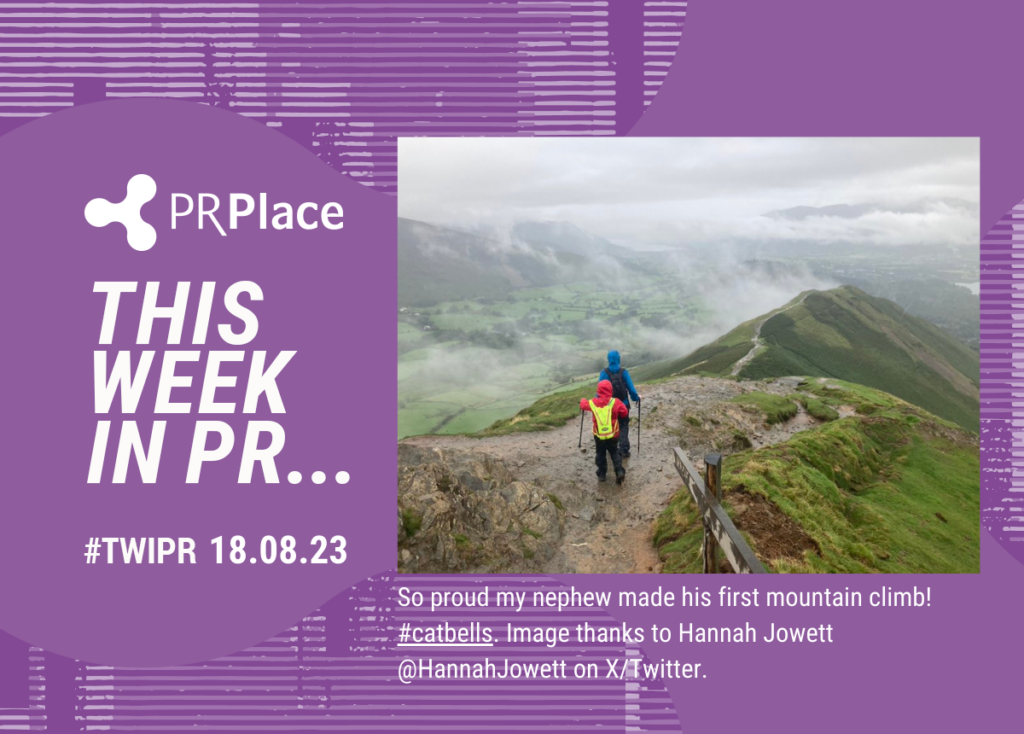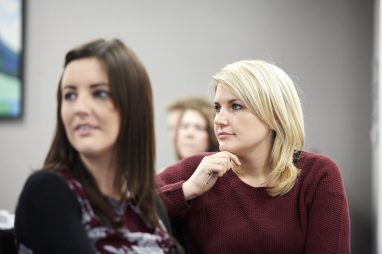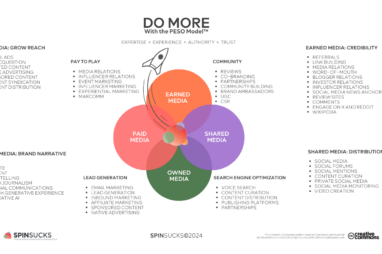This week in PR (18 August)

About the author
Richard Bailey Hon FCIPR is editor of PR Academy's PR Place Insights. He teaches and assesses undergraduate, postgraduate and professional students.

It happened this week
My A-level results were tragic and I’ve managed to do alright. Don’t let letters and numbers define your worth. pic.twitter.com/A0OR7tAzOv
— Advita CommsRebel (@Advita_p) August 17, 2023
- Empathy and communication: Which successful leader is being described here? ‘She wants to know you on a human level, not just as a player. She has conversations with you about your family… Her communication levels are on another level [sic].’ From the clues, and the timing, you should have guessed it’s Sarina Wiegman, head coach of the England women’s football team which has reached a world cup final for the first time, described by former England player and BBC columnist Ellen White.
- Michael Parkinson: I’d known about his work as a newspaper reporter before later becoming a TV talkshow presenter. But I’d not known about the intervening role as a press liaison officer with the army during the Suez crisis, as noted in The Guardian.
Profession
Doing some research on @MelissaFleming who is giving the 2023 @CIPR_Int Maggie Nally Lecture. This is really moving. Don't miss the lecture. https://t.co/fQZbo5t04l
— Steve Shepperson-Smith (@SteveShepSmith) August 17, 2023
Purpose, climate and ESG
SUSTAINABILITY COMMUNICATION DIPLOMA
- Sophie Howe: Braving change (17 August)
‘All too often when politicians have put their heads above the parapet to put in place the – often unpopular reforms needed to tackle climate change, they are hit with backlash; backlash which is often driven by mis or disinformation.’
Consulting, skills and careers
- Robert Minton-Taylor: LEAVING YOUR DEMONS BEHIND – a PR executive’s journey beyond stroke (15 August)
‘Why has so little changed since I began my career in 1967? As PRs we are great with words, but sometimes our actions are wanting.’ - Louise Thompson: Communications and Marketing – forever frenemies? (15 August)
‘Why was Comms deemed less “strategic”, less “senior” than Marketing, even though comms drove the organic awareness, leading to user acquisition and dealt with complex reputational crises that could have destroyed our brand and our growth?’ - Andy West: Tech PR must fight back (14 August)
‘To win in the current climate, agencies need to build sharp new business and marketing skills. Acknowledging this typically falls to the senior cohort means that time must be ring-fenced to make this happen. A common failing is that spare capacity is wasted on over-servicing clients rather than a concerted effort to find new contracts.’
Gender, diversity, health and wellbeing
- Emily Horton: Smashing the plastic ceiling: how Barbie’s inclusive communication approach broke the mould (16 August)
‘Barbie’s expansive marketing strategy not only promoted the film but also reinvigorated the feminist discussion on a global scale.’ - Maria Darby-Rorke: Navigating Cultural Mine Fields (no date)
‘As businesses strive to become ever more inclusive, diverse, and have a global outlook, the importance of understanding cultural differences is bound to increase. Wanting to better equip myself, I turned to ‘The Culture Map’ by Erin Meyer.’ - Imogen O’Rorke: Ageism is the elephant in the office (15 August)
‘The facts are quite compelling. We have an ageing workforce – a third of all UK workers are now aged over 50; and we are heading for a skills drought – a shortfall of 50 million in the workforce is predicted by 2050.’
Politics, public affairs and public sphere
- Emily Chen: Is the government succeeding in setting the news agenda this summer to win voters back? (15 August)
‘Despite initial hopes that Sunak’s five pledges would have been ‘easy wins’ for the Conservatives, the reality today is far different and it has been made even more challenging to demonstrate progress when news reporting in parallel highlights contextual challenges like inflation and skills pipelines also impacting success.’ - John McTernan: Rishi Sunak is plotting to make this the net zero election. That’s great news for Labour (15 August)
‘Change has to be to something, not merely away from the present. Which leads to the second point: progressive parties win when they own the future and fairness.’
Brands, content, community and creativity
- Maja Pawinska Sims with Kate Gibson and Jim Shearer : Podcast: How Brands Can Build Consumer Love In A Cost-Of-Living Crisis (15 August)
‘Of all the agencies since I’ve come into the business they [Cirkle] are the one that’s genuinely and consistently pushed us to be braver, be bolder in the briefs that we’ve put forward.’ - Anthony Hughes: The Barbie Movie – Great cinema or just another corporate press release? (15 August)
‘For all it’s an enjoyable film with a positive message, but on another level it’s Mattel turning to a tried and tested formula for companies with historic brand equity to reposition themselves or revive their IP and make it culturally relevant again through the medium of blockbuster movies.’
Research, data and evaluation
- Katy Hetherington: Beyond data: How to use your intuition to make better business decisions (15 August)
‘Intuition complements decision-making by offering a human perspective where factors beyond data are considered — unearthing potential opportunities and risks, sparking creative innovation, all while gaining validation through data analysis.’
Crisis, risk and reputation
It seems the way FOI operates in many organisations and particularly the police needs a review. Over many years cuts have left very small teams carrying very big risks https://t.co/K0aGVyVu5n
— Amanda Coleman (@amandacomms) August 15, 2023
- Jenni Field: Managing reputation and risk with Eva Maclaine [podcast] (16 August)
‘To have a good reputation first recognise you don’t own your own reputation. It’s in the perception of other people, so you need to make sure that perception is accurate. Organisations have to understand their purpose, know their values and how they fit into society; they have to have very good risk management.’
Behaviour and influence
- Son Pham: Is there ethical influencing under capitalism? (16 August)
‘Everyone wants to be a creator these days – digital nativity, technology advancements and internet accessibility will continue to empower individuals to monetise their content and social media presence.’ - David Olajide: Understanding Human Behaviour: The DISC Approach (14 August)
‘The key to communication starts with self-awareness. Understanding yourself and how you prefer to communicate is critical to you and those who work alongside you. Developing empathy and taking the time to understand the different types in your team is what makes a dream team.’
Internal communication
Internal Communication Diploma
- Katie Macaulay: The message must change at each leadership level: Dr Kevin Ruck [podcast] (16 August)
‘The cascade team briefing approach is based on a flawed assumption. You need to ask employees what they want from their line managers and what they want from their senior managers in terms of communication.’
- Dan Holden: A candid conversation with Emily Hecker (16 August)
‘While the COVID-19 pandemic was one of the darkest periods in recent history, it brought internal communication out of the shadows. The extended period of crisis communication transformed what was once an outsider at many organizations into a valued business function.’
Media, digital and technology
- Matt Redley: The SEC Newgate AI Weekly (15 August)
‘TikTok is working on a way for creators to disclose if their posts contain AI-generated content, representing a significant step towards tackling deepfake/misinformation on its platform.’
- Stephen Waddington: Call for submissions for AI #PRstack tool guide (15 August)
‘We are inviting practitioners to submit articles which describe their favourite AI tool. This is expected to include the tool’s scope and an example application.’ - Antony Cousins: How to ask a really good question. (14 August)
‘Once I’d started treating ChatGPT less like a Google search and more like having a conversation with a colleague I slipped into an old thought pattern I built up when working at the Ministry of Defence.’ - Alan Woods: The photo call has evolved into the live opportunity (14 August)
‘There is risk when broadcasting live video – and please, please encourage the journalist to come along with a proper mic to avoid a lack of sound disaster – but you prepare your speakers for broadcast interviews, so why is this any different?’


